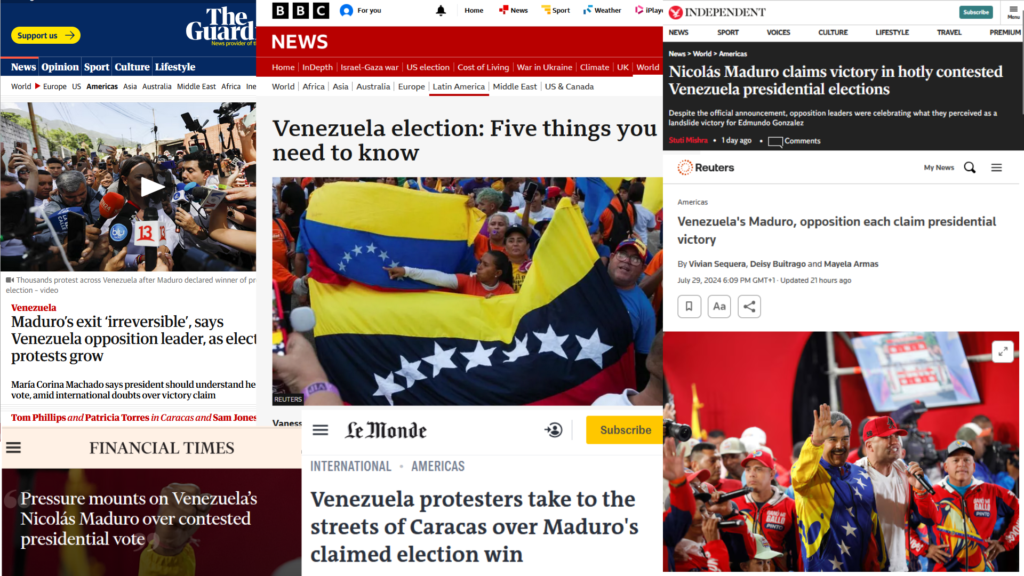The role of the US and its allies
The US and its allies were calling for Nicolás Maduro to recognise the election result right up until the polls closed, but only claimed irregularities in the election once it was clear that their candidate Edmundo González had lost. These claims made headline news.
This refusal of the US, Britain and others to accept the outcome of elections without any valid evidence was extremely irresponsible. It led to anti-democratic violence against public property, including attacks on hospitals and pharmacies.
Painstaking work has taken place in recent years in Venezuela to build dialogue and to encourage opposition parties to forgo election boycotts and stand for election. These actions by the US and their allies to delegitimise the election are a return to the tactics of violent destabilisation seen in 2014 and 2017 and coup mongering.
The key role of the National Electoral council in securing a fair and transparent election
Elections in Venezuela are the responsibility of the National Electoral Council (CNE) which is an independent state authority. The CNE oversees five key safeguards for veracity, fairness and transparency in the elections:
Completely automated electronic voting, with machines that cannot be accessed by any outside computer;
Verification of the electronic vote through a paper trail;
Voter ID by using a fingerprint of the voter to verify their identify, but not their choice of candidate;
16 independent audits of the electoral process, conducted before the vote of the software and machines used, during the voting itself and after the results are in;
Hundreds of international observers at all elections – 109 observer groups at this election issued a statement “recognizing the valuable work of the National Electoral Council of the Bolivarian Republic of Venezuela that guaranteed the holding of elections throughout the Venezuelan territory through an electoral mechanism with the highest standards of transparency and auditability that place them as one of the best in the world.”
A calculated tactic by the extreme right-wing opposition
Despite these electoral safeguards, the extreme right-wing candidate Edmundo González (and Enrique Márquez, another far-right candidate), refused to sign a declaration requested by the CNE promising that they would respect the election results and shun any violence afterwards, in contrast to all the other candidates.
The right-wing’s history of claiming fraud – but without evidence
The right-wing opposition has lost every election since Hugo Chávez’s election win in 1998 except for the 2015 National Assembly elections – and has claimed fraud every time it has lost, but without producing any valid evidence. This 2024 Presidential election was no different.
The media’s drive to push a narrative
Edmundo González claimed that he had evidence that proved he had won the presidency, publishing on a private website set up before the election data from precincts that purportedly showed he had secured 70% of the vote. The mainstream media uncritically reported his claim that his vote was based on tallies from some 80% of polling stations, even though other published analyses debunked that figure and showed his ‘evidence’ to be bogus
When President Maduro asked the high court to review the electoral results by examining all the electoral evidence, including voting records held by all ten candidates, nine out of the ten presidential candidates and representatives from political organisations that backed them duly attended hearings at the Supreme Court headquarters in Caracas.
The only candidate not to comply with the judicial order to present the physical voting records held by him was González.
Rather than ask why González’s team did not provide the vote-tally receipts it claimed proved his victory, the media simply reported his claim that attending the court hearing would have put him at “risk” of detention.
The corporate media’s support for Maria Corina Machado
González, a former diplomat with no experience of running for office, was a proxy candidate for extreme right-winger Maria Corina Machado who throughout the election was the power behind his campaign.
The corporate media’s enthusiasm for Machado failed to mention that she is a long-time supporter of the US’s economic sanctions against Venezuela and has repeatedly called for US military intervention against her own country to remove President Maduro by force.
As such, she wasn’t “banned” from standing as reported in the media but rather constitutionally disqualified from being a candidate, by the Supreme Court in a process agreed under the Barbados Agreement signed by the government and all opposition parties.
Other more moderate opposition figures with experience and popular followings offered the US a choice of who to back in the election had it wished to see Maduro electorally defeated. Instead, it backed Machado, standing (albeit in a considerably less than overt manner) on a programme of privatising nearly all state institutions serving the people – schools, hospitals, public housing, food assistance, and the state oil company, which funds social programmes. She combined this with a call for more sanctions on Venezuela to bring about regime change.
Updated December 2024

